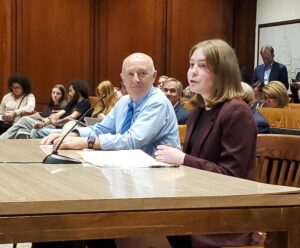Who is a member?
Our members are the local governments of Massachusetts and their elected and appointed leadership.

MMA Legislative Analyst Josie Ahlberg, right, and Marlborough City Council President Michael Ossing, chair of the MMA Policy Committee on Energy and the Environment, testify about bills related to extended producer responsibility during a June 14 hearing of the Joint Committee on Environment and Natural Resources.
The Legislature is considering several bills this session that would hold producers responsible for the end-of-life management of their products and packaging, a concept that could help local governments manage their increasing recycling and solid waste costs.
Thirty-three states have enacted extended producer responsibility laws, according to the Product Stewardship Institute, a national nonprofit that supports EPR policies and programs. The institute says these laws have led to the launch of responsible post-consumer management programs for products such as paint, mattresses, carpets and electronics.
In a resolution approved at its Annual Business Meeting in 2019, the MMA declared its support for EPR for products including mattresses, paint and electronics. The resolution noted ongoing challenges to the operation of municipal waste management and recycling programs, and sought to advance the development of policy and advocacy strategies to enhance waste reduction, diversion, recycling and disposal options for municipalities.
In June, the MMA testified before the Joint Committee on Environment and Natural Resources supporting bills to establish EPR for paint, mattresses, packaging materials and electronic products. The bills included H. 823, S. 551 and S. 542 on paint recycling, H. 881, H. 916 and S. 513 on mattress recycling, H. 779, S. 572 and S. 471 on packaging stewardship, and H. 871 and S. 554 on electronic product recycling.
The MMA also testified in support of H. 767 and S. 525 on single-use plastics and H. 784 and S. 447 on plastic bag reduction.
The MMA contends that this slate of bills would help to address the rising costs for recycling services, capture more recyclable materials, and ensure that proper procedures are followed. Targeting specific materials — such as those that take significant space in landfills, contain elements that can be reused, or get easily caught in processing machinery — would help the complex network of waste management operating statewide.
Bottle bill
Lawmakers are also considering proposals to strengthen and update the state’s 40-year-old bottle return law.
At recent hearings before the Joint Committee on Telecommunications, Utilities and Energy, the MMA testified in support of two bills that would expand the bottle bill. The bills, S. 3690 and S. 2104, would expand the range of containers eligible for deposits and redemption, and increase the bottle deposit from five cents to 10 cents.
Many now-common containers, such as water bottles, sports drinks and miniature alcohol bottles, are not covered by the current statute. An updated bottle bill could boost the recycling rate of beverage containers from the current 42% to as much as 95%, according to a 2022 report from Reloop.
The EPR and bottle bills await further action from the Joint Committee on Environment and Natural Resources and the Joint Committee on Telecommunications, Utilities and Energy.